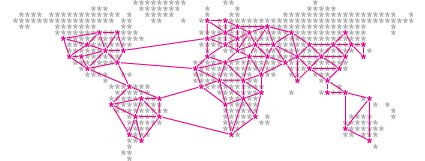I think there’s a big difference between having a central hub which contains information pertaining to the D* network but which is separate from the network itself (such as the project website, poduptime, etc), and a central hub which is an integral part of the D* network and receives/sends/stores data from that network, such as post data, which is what is being proposed here. With a central hub as an integral part of the network, the network would no longer be fully distributed.
If a central hub of any sort is actually needed in order for post/tag federation to work properly, I suggest it be restricted to holding meta-data, such as a list and IP addresses of pods or relay servers. This could be the same central hub which helped people to choose a pod to register at, as poduptime does at the moment.
It would then only be referred to when a new pod or relay server was brought online. The new pod would then call hub.diasporafoundation.org (for example), which would give it some pods/relay servers to contact from which it could pull post data. The actual transmitting of post data would be done by the pods/relay servers themselves, with no involvement from the central hub.
This is similar to one of the proposals I made in this discussion on adding pull to Diaspora’s push model (the proposal concerning tags).
I’m not sure relay servers separate from the pods themselves would be needed; I think there is a way of making pods federate public data more effectively without using a separate network of relays, if they are connected correctly together.
Note that in the following, when I talk of connections/sharing between pods, I’m not talking about the normal connections between pods which exist, but a kind of meta-network to push public data around more effectively, of the kind Jason talks about in his proposal.
I would suggest using a kind of ‘cell structure’, in which each pod is connected directly with several other pods in the network, and through that structure build up a list of public posts and tagged posts data to pass on to other pods. This avoids the problem of scalability faced if ‘every pod knows every pod’. If the relay connections between pods are made correctly, public data will be federated to every pod quickly, via indirect routes (Pod A shares it with the several pods to which it has direct connections; those pods share it with the pods with which they have direct connections; and so on). If there is redundancy built in to this network, it won’t matter if several pods in this network are down; the data will get fed around to the whole network eventually in any case.
It might be that each pod needs to be connected only to two other pods in the network for this to work, like the classic Communist cell structure – as in the graphic below (not perfectly illustrated, but it gives you an idea):

I’m sure there is a way of coding into the D* software itself so that it builds a network of connections such that each time a new pod is brought into the network, the network recalibrates its connections so that this new pod is made a part of the sharing network, without reference to any external source such as relay servers or a central hub. Likewise each time a pod drops out. However, I would have no idea how to do this! I hope someone out there will do, and that my partly developed concept will spark ideas for practical solutions in their mind.
If a central hub is needed to help new pods get connected, I think we should have a mirror or two on other servers just in case the project site is down when a pod is brought online.


 A bunch of relays taking care of the public post handling in a decentralized way - and pods will not even have to decide which relay to use, giving total redundancy even if all except one relay is down.
A bunch of relays taking care of the public post handling in a decentralized way - and pods will not even have to decide which relay to use, giving total redundancy even if all except one relay is down.